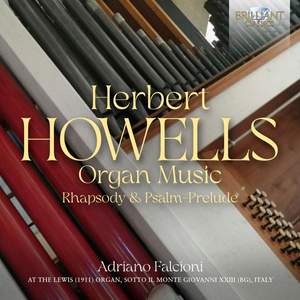- Herbert Howells (1892-1983) was an exponent of the so-called English musical Renaissance, a historical period between the end of the 19th and the beginning of the 20th century, which saw composers such as Ralph Vaughan Williams, Gustav Holst, Charles Villiers Stanford, engaged in charting a new path in English music. A path marked by tradition and, at the same time, by a freer use of musical language. Where their contemporaries focused on serialism, aleatoriness, electronic music and other techniques typical of the 20th century, they preferred to find new ways of using the tonal and modal system, thus succeeding in creating a style that was framed in tradition but at the same time original and immediately recognizable.
- Howells’ organ works, spanning a range of styles and moods, showcase his profound understanding of the instrument's capabilities. His compositions often intertwine rich harmonies, intricate counterpoint, and a deep sense of spirituality, reflecting both his personal experiences and the broader cultural context of his time.
- This new recording presents 3 Rhapsodies, 3 Psalm-Preludes and 3 Pieces for Organ, played on the Lewis (1911) organ, Sotto il Monte Giovanni XXIII (BG), Italy.
- Adriano Falcioni’s recordings for Brilliant Classics encompass many of the Romantic era’s most celebrated organ composers. Praise in Fanfare for his previous albums: ‘Falcioni clearly has the right feel for this repertoire, in tempos and registrations and ability to bind together phrases and sections into coherent larger wholes’ (Reger, 95075). ‘A top contender… Everything is idiomatically played by Adriano Falcioni on a fine instrument… Strongly recommended’ (Brahms, 94460). Further praise for the Reger album, recorded on the same organ as the present set of Liszt, came from the Italian Organ Compendium: ‘Highly recommended to our readers, who will find an excellent repertoire, a very good interpreter and an instrument of great interest.’



